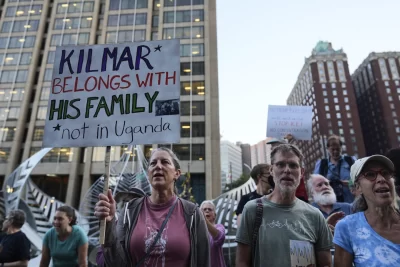
U.S. Treasury Secretary Janet Yellen will host Chinese Vice Premier He Lifeng for two days of talks this week, the latest in a series of high-level talks between U.S. and Chinese officials as the world’s two largest economies aim to ease tensions, the Treasury Department announced Monday.
The Yellen-He talks set for Thursday and Friday come ahead of the start of the Asia-Pacific Economic Cooperation summit in San Francisco which starts November 11. President Joe Biden and Chinese President Xi Jinping are expected to meet next week during the summit, what would be the first engagement between the two leaders in nearly a year.
“As a foundation, our two nations have an obligation to establish resilient lines of open communication and to prevent our disagreements from spiraling into conflict,” Yellen wrote in a Washington Post op-ed to spotlight the upcoming meeting. “But we also know that our relationship cannot be circumscribed to crisis management.”
The meeting between the two senior government officials comes after Biden spoke with Chinese Foreign Minister Wang Yi at the White House for about an hour late last month, when Beijing’s top diplomat came to Washington for talks with U.S. Secretary of State Antony Blinken and White House national security adviser Jake Sullivan. Xi similarly met with Blinken in June when the secretary of State traveled to Beijing for talks with Wang.
Yellen last met with her counterpart He during a July visit to Beijing, when she urged Chinese government officials for cooperation on climate change and other global challenges and not to let sharp disagreements about trade and other irritants derail relations.
Yellen is expected to amplify the message on climate during her talks with He in San Francisco. Treasury in a statement said that Yellen will also underscore that the Biden administration “will take targeted action to advance our national security and that of our allies, and protect human rights, but we do not use these tools to seek economic advantage.”
Tensions between the two countries remain high, including over U.S. export controls on advanced technology. The Biden administration has also taken Beijing to task for economic practices that it says have put U.S. companies and workers at a disadvantage.
The U.S. has also criticized China’s lending practices under its $1 trillion Belt and Road Initiative, a network of projects and maritime lanes that snake around large portions of the world, primarily Asia and Africa. Critics, including the Biden administration, say China’s projects often create massive debt and expose nations to undue influence by Beijing.
Yellen in her op-ed wrote she would raise during the meetings the administration’s “serious concerns with Beijing’s unfair economic practices, including its large-scale use of non-market tools, its barriers to market access and its coercive actions against U.S. firms in China.”
The U.S. has also repeatedly raised concerns about China’s assertive actions in the East and South China seas.
The U.S. military last month released a video of a Chinese fighter jet flying within 10 feet (three meters) of an American B-52 bomber over the South China Sea, nearly causing an accident. Earlier in October, the Pentagon released footage of some of the more than 180 intercepts of U.S. warplanes by Chinese aircraft that occurred in the last two years, part of a trend U.S. military officials call concerning.
The U.S. also has renewed a warning that it would defend the Philippines in case of an armed attack under a security pact, after Chinese ships blocked and collided with two Philippine vessels off a contested shoal in the South China Sea.
Beijing has released its own video of close encounters in the region, including what it described as footage of the USS Ralph Johnson making a sharp turn and crossing in front of the bow of a Chinese navy ship. The U.S. destroyer also was captured sailing between two Chinese ships.
___
Associated Press writer Ken Moritsugu in Beijing contributed to this report.



